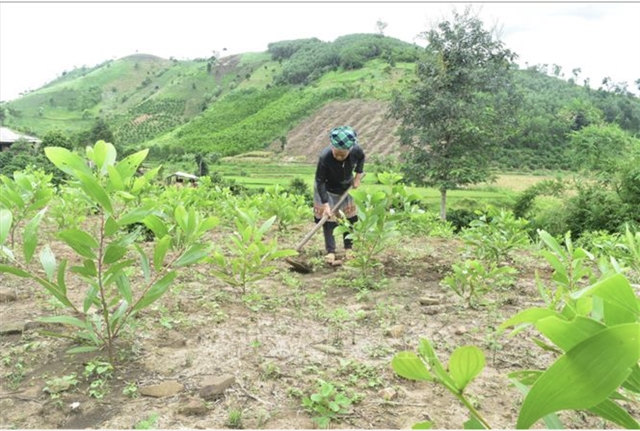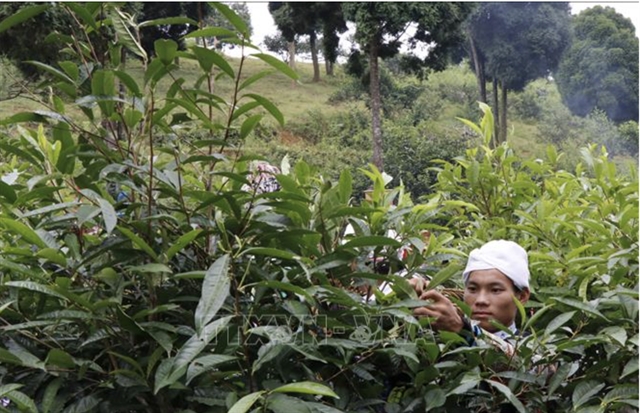 |
| Giàng Thị Chợ, a resident in Ea Uôl Hamlet of Đắk Lắk Province is working in her acacia garden which is set up by a loan from the National Target Programme for Socio-Economic Development in Ethnic Minority and Mountainous Areas. VNA/VNS Photo |
HÀ NỘI – The National Target Programme for Socio-Economic Development in Ethnic Minority and Mountainous Areas for the period 2021 – 2030 has created positive changes, making important contributions to hunger eradication and poverty reduction, and promoting economic development in many regions throughout the country.
The goal of the programme is to enhance socio-economic development in ethnic minority and mountainous areas in a sustainable way to raise people’s income and gradually narrow the development gap between mountainous and lowland areas.
After three years of implementation, the lives of people in ethnic minority and mountainous areas are gradually changing positively. Essential infrastructure serving production and life is prioritised for investment to create an increasingly prosperous rural appearance.
Many traditional cultural values are preserved and promoted in association with tourism development.
In particularly difficult areas, the programme has focused on developing socio-economic infrastructure facilities creating favourable conditions for people to access high-quality services, preserving and promoting traditional cultural identity, and improving the quality of human resources.
In addition, the programme has introduced measures to support the development of production and livelihoods, creating motivation for mountainous and ethnic people.
Up to now, localities have implemented nearly 5,000 projects in ethnic minority and mountainous areas, supporting 489 households with residential land and 14,760 households with production land, building 116 reallocated areas and deploying 445 models to support production development along the value chain and 249 models of entrepreneurship and business start-up in ethnic minority and mountainous areas.
Thanks to that, the poverty rate in 2022 decreased by 3.4 per cent, exceeding the assigned target.
Determining this as a “driving force” for comprehensive development of ethnic minority and mountainous areas, government and relevant sectors have simultaneously implemented the programme in all localities and achieved encouraging achievements.
Northern Yên Bái Province, which is home to more than 30 ethnic groups, accounting 57 per cent of total population of 85,000 people, has issued many support policies to eliminate hunger, reduce poverty, and raise the people’s living standards.
During the last three years, the province has allocated over VNĐ12 trillion (US$500 million) for socio-economic development in ethnic communities and mountainous areas that focused on production, infrastructure construction, transportation network, education and health care service, poverty reduction and building new rural areas.
The poverty reduction work has achieved positive results with the average reduction rate of over 4 per cent per year.
This year, the province aims to reduce the household poverty rate by 3.5 per cent and the rate of near-poor households 1.22 per cent compared to 2022.
 |
| An ethnic man harvests tea in Văn Chấn District of Yên Bái Province. VNA/VNS Photo |
Mù Cang Chải District, one of the most impoverished districts of Yên Bái, has implemented many projects providing residential land, housing, production land and clean water, and investing in essential infrastructure, sustainable agricultural and forestry production with a total investment capital of nearly VNĐ75 billion ($3.1 million), of which the public capital is over VNĐ43.5 billion ($1.8 million).
Lý A Lâu’s family in Nậm Khắt Village, one of poorest households in the district, is an example of life changing thanks to the programme.
Previously, his family lived in a dilapidated makeshift house.
Earlier this year, he was offered assistance worth VNĐ50 million ($2,000) from the State budget to build a new house. Gathering other resources as well, his family built a new solid house that is a great motivation for his family to stabilise their life, increase production, and develop the household economy.
Lý A Lâu said: “In the past, my family was very poor. Now, with support from the province and district to build a house and getting preferential loans, I have boldly invested in livestock and production that helps us stabilise our lives and take care of the children.”
Thào A Phềnh, chairman of Nậm Khắt Commune, said that for households lacking livestock and housing, the programme has brought important meaning to the people, motivating families to strive for production and economic development, contributing to hunger eradication and poverty reduction in the area.
In addition to the achievements, the province has encountered difficulties and obstacles in slow disbursement of capital. Solutions are needed to speed up the programme implementation progress.
According to Đỗ Quang Vịnh, vice director of the provincial ethnic committee, currently, the total capital allocated by the Central Government is VNĐ592 billion ($24.4 million) but only VNĐ315 billion ($13 million) has been disbursed, reaching 28 per cent.
Opportunities to escape poverty
The programme implementation has helped thousands of poor and near-poor households and ethnic groups in Đắk Lắk Province access preferential capital to develop production, create jobs, increase income, and improve their lives.
The Tây Nguyên (Central Highlands) province has 130 communes in 15 districts, towns and cities in ethnic people and mountainous areas including 519 extremely difficult villages and hamlets benefiting from the programme.
This year, the province’s poverty rate decreases by 1.75 per cent, of which the rate of poor households among ethnic communities dropped by 3.5 per cent compared to last year.
Cư Pui is a commune of Krông Bông District with population of over 15,000 people, of which the ethnic groups account for about 90 per cent.
The land here is arid and the climate is harsh, so people face many difficulties.
Nguyễn Minh Nghiệp, the commune’s People’s Committee chairman, said that implementing the Government’s policy, the locality has co-ordinated with the Việt Nam Bank for Social Policies (VBSP) to review and select poor households to offer soft loans.
So far, 128 households have been supported with loans according to Decree 28/2022/NĐ-CP with a total amount of more than VNĐ6 billion ($248,000).
Giàng Thị Chợ, a resident in Ea Uôl Hamlet, has more than one hectare of land that used to grow cassava, but the cultivated land has been eroded and degraded for many years so it is not productive anymore.
In late 2022, her family was offered a loan of VNĐ50 million ($2,000) for changing crop.
She invested in 10,000 acacia trees.
After a year, the acacia trees grew well and brought her higher income.
In order for the capital to be effective, VBSP has co-ordinated with local authorities, organisations, associations and entrusted unions to review beneficiaries and loan needs.
Thereby, people can borrow capital suitable for their livelihoods, promote efficiency and create conditions for escaping poverty.
After more than a year of implementation, VBSP – Đắk Lắk branch, has disbursed more than VNĐ58 billion ($2.4 million), with over 1,070 households accessing preferential capital, 96 households of which were supported to build and repair houses, 54 households were provided with production land, and 924 ones were supported to change jobs.
The capital has helped people expand production and improve their lives.
Thượng Văn Điệp, vice director of VBSP – Đắk Lắk branch, said that during the implementation, there are still some difficulties, especially the review of specific subjects eligible for assistance that are basically behind schedule.
In the coming time, the branch will try to speed up the pace, co-ordinate closely with units to review subjects eligible for the programme and supplement and complete documents to disburse money as quickly as possible, said Điệp.
In order to increase the effectiveness of the programme, the People’s Committee of Đắk Lắk Province has proposed many solutions to be implemented in the coming time including the completion of necessary procedures to disburse programme capital and the enhancement of investment for key projects.
The Government should review and adjust targets and roadmaps for implementing goals in a way that allows localities to choose urgent projects to deploy and ensure the roadmap and appropriate amount of allocated capital aiming at creating motivation and increasing the effectiveness of the programme.
Challenges and shortcomings
Hà Việt Quân, chief of the programme’s Co-ordination Office, said that this is one of the Government’s three current national target programmes spending huge resources to ethnic minority areas.
After three years of implementation, although there are still limitations, difficulties and challenges, the programme plays an important role in exploiting potentials for the socio-economic development of the areas.
The Party and Government have issued policies to prioritise resources as well as investment for the development of areas to ensure the goal of narrowing the gap between the mountainous areas and the lowlands, Quân said.
Localities encountered many difficulties and challenges because the programme has many tasks and is deployed in a large area covering many fields from culture, health and education to national defence, agriculture and transportation.
Therefore, the first challenge is identifying the right beneficiaries of the policies. This takes a long time because the area is large and divided, said Quân.
The next challenge is to find legal documents by the Government and related ministries and sectors instructing the implementation, because the programme consists of 10 different projects and 14 sub-projects relating to 36 very large policy contents.
Besides, in reality in ethnic minority areas, the staff capability of grassroots government apparatus is relatively modest, while it must deploy a large amount of work and disburse a large amount of money. Therefore, local authorities face pressure during the implementation.
It is necessary to further decentralise for localities to create conditions for them to be proactive in implementing projects to suit the needs, characteristics, and actual situation of areas home to ethnic communities, Quân said.
Because the ethnic community areas are very different, the northern mountainous region is different from the Central Highlands and Southwest. There are even ethnic groups living in the same area but having very different socio-economic characteristics and cultural life, he said.
Therefore, decentralisation needs a plan and roadmap to ensure all localities can implement it, he added. VNS
- Reduce Hair Loss with PURA D’OR Gold Label Shampoo
- Castor Oil Has Made a “Huge” Difference With Hair and Brow Growth
- Excessive hair loss in men: Signs of illness that cannot be subjective
- Dịch Vụ SEO Website ở Los Angeles, CA: đưa trang web doanh nghiệp bạn lên top Google
- Nails Salon Sierra Madre
 VnExpress News The News Gateway of Vietnam
VnExpress News The News Gateway of Vietnam





